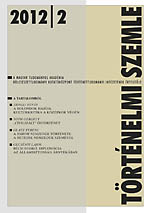„Egytelkes nemes”. Egy középkori fogalom magyarázatához
“One-plot Nobleman”. On the Interpretation of a Medieval Concept
Author(s): Tibor NeumannSubject(s): History
Published by: Magyar Tudományos Akadémia Bölcsészettudományi Kutatóközpont Történettudományi Intézet
Summary/Abstract: The expression of “one-plot noblemen” (nobiles unius sessionis) is liable to frequent misinterpretation in the Hungarian scholarly literature. The group designated with the term is generally thought to have been a separate social layer at the bottom of the noble class, and its member are consequently also frequently referred to as landless, poor or peasant nobles. They are normally percieved as having enjoyed full noble rights, but only managed one single noble plot of land. The author, however, demonstrates with the help of late medieval legal texts that the expression, which turns up in Hungary for the first time in 1463, was in fact a synonym for “nobleman having no tenants” (nobilis iobagiones non habens), which occurs fairly frequently from 1397 on. Thus, such a nobleman could possess several noble plots, and even a deserted peasant plot, but, at the moment when the tax was levied, he had no peasant plot liable to taxation. Moreover, not only persons enjoying “full” or “general” nobility were rated among them, but also other possessors of land who had no peasant tenants, such as the so-called prediales, who were subjected to ecclesiastical authority, or the “castle nobles” who were attached legally to a given castle. Now, what was the common feature which linked these social groups of various legal status to each other? It is certainly conspicuous that the laws only regulated the modes of their taxation and military service. The reason which underlay this is that the basis for taxation and recruitment was precisely the inhabited tenant plot, and thus, in the case of this group, only the person itself or his noble plot could be burdened with the tax. Consequently, the expression of “one-plot noblemen” is merely a contemporary term of taxation, the exact content of which, emerging in the course of taxation, could perhaps depend on the will of the taxpayer himself, but which by no means designated a separate layer of society. It has to be added that, thanks to their fluctuating fortunes, some poorer noble families were variably listed among the one-plot noblemen and those with a few tenant peasants, which means that in their case it would perhaps be more salutary to speak about petty/inferior nobility (nobiles minores/inferiores), an expression also warranted by the contemporary legal texts.
Journal: Történelmi Szemle
- Issue Year: 2012
- Issue No: 02
- Page Range: 337-345
- Page Count: 9
- Language: Hungarian

